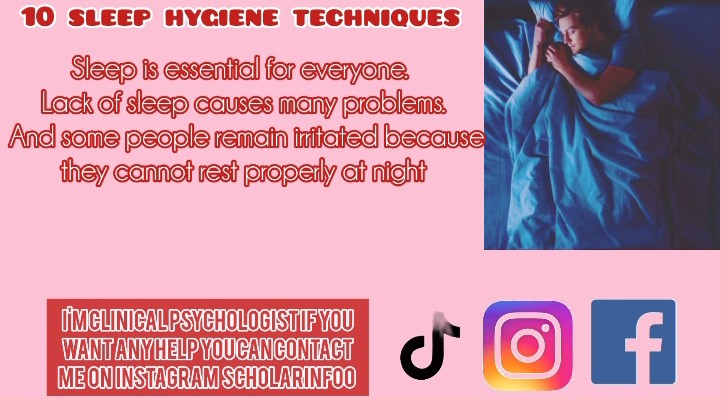Ready to Break the Night Owl Habit? 10 Steps to Stop Staying Up Late
10 steps of sleep hygiene; Sleep is essential for everyone. Lack of sleep causes many problems. And some people remain irritated because they cannot rest properly at night. Every day we see many patients complaining of insomnia. Some people wake up in the morning after sleeping all night with one hand. On the other hand, they sleep late and eventually wake up late. I’ll discuss it in today’s article and explore it further.
If you’re a night owl, there’s good news: you can still change your sleep cycle! Read on to find effective ways to adjust your sleep schedule. So you can go to bed and wake up earlier.
Although staying up later than usual can be beneficial, This is especially true if you feel more alert, creative, and productive at night. But it can be challenging on mornings at work or school when you regularly stay up late. In this case, you may need to take it easy. Adjust your bedtime so you fall asleep faster and wake up feeling refreshed.
What are the common indicators of poor sleep hygiene?
Several signs of poor sleep hygiene can be noted in important aspects of functioning. One type is that, you may have difficulty falling asleep at night, or often wake up and find it hard to go back to sleep. Also, you may feel too fatigued, or sleepy during the day which once again highlights the problem of sleep deprivation. More so, an irregular sleeping schedule in regard to the duration and quality of sleep is also another obvious indication that one’s sleep hygiene is in dire need of improvement. These problems can be remedied so that you will be able to sleep better and improve on your overall health.
How can you improve your sleep hygiene?
Good sleep hygiene sets you up for regular, restful sleep. You can make it easier to get quality sleep by adjusting your sleep schedule. Evening routine and daily routine appropriately. In addition, creating a comfortable and quiet bedroom atmosphere also invites relaxation.

These are 10 steps of sleep hygiene
1. Get Light early in the morning
Manipulating light in the bedroom—dark at night and moderate in the morning—may improve sleep quality in young people.
And also another beneficial source state that Morning sunlight after waking of one hour may boosts your mood level, reduces stress/anxiety, and also improves sleep quality.
As, I’m clinical psychologist and also worked with many clients according to my personal point of view sunlight especially morning light helps person to keep relax and also this practice improve the person sleep quality.
2. Go to sleep and wake up at the same time
To maintain a consistent sleep routine. Set your alarm clock for the same time every morning. Even on weekends. From my personal experience maintaining a regular wake-up time can really make a difference.
When I make small adjustments to my bedtime, like going to bed a little earlier every night, I find that I naturally stick to the same bedtimes and wake times. This way my body adapts more easily. Which makes me feel refreshed every morning Instead of trying to make big changes all at once. Try changing your bedtime every so often. A few days to create a long-lasting routine.
3. Create a relaxing bedtime routine — and stick with it
Creating a relaxation routine before bed will help your mental and physical relaxation. And you get ready to sleep by making this routine consistent, you signal your body that it’s time to rest. This will make falling asleep easier and faster.
It is best to start your daily routine 30-60 minutes before bedtime. Choose calming activities while avoiding blue light machines. Here are some effective ideas:
- Hot garden or bath; The heat will instantly cool you down. And afterwards, when your body relaxes, you will naturally feel sleepy.
- Stretching or gentle yoga; These can relieve muscle tension. It helps you feel relaxed.
- Do a few minutes of meditation; to relax the body and mind.
- Listen to calming music; Relieve stress while listening and focus on your breathing.
- Read books; Choose physical books over electronic devices that emit blue light.
Avoid anything that can overstimulate you, such as heated conversations or work-related activities. These can make your mind too sharp to sleep.
Engaging in simple bed time routine such as a sleep hygiene, and an effective sleep pattern can help healthcare professionals deal with increased “sleep time burdens” while sustaining their overall well-being. This research conducted in 2024.
4. Turn off electronic devices before you go to sleep
Electronic devices, such as phones, emit blue light, which can decrease melatonin levels. How the sunlight rises. And alertness to blue light cues greatly facilitates ventilation.
About melatonin; Melatonin is a natural hormone that regulates the sleep-wake cycle. When melatonin level will lower in your body than it will hardly person can sleep. Blue light doesn’t just cause a decrease in melatonin. But it also keeps your brain more alert. This in turn increases barriers to restful sleep.
If you keep your phone close to your bed than it can further ruin your sleep. Even if you don’t use it. The nightly news, buzzing sounds, or sudden bright lights can disturb your comfort and affect your quality of sleep without your knowledge.
A Research in 2024 indicate Adolescents’ electronic device engagement, particularly before sleep, has real adverse effects in sleep patterns which brings about the guidelines limiting the screen time usage.
5.Limit your caffeine intake
The effects of caffeine can last from 3 to 7 hours after consumption. This means that afternoon coffee can help you stay awake longer than you’d like.
Although caffeine intake is generally limited to the morning, But tolerance will vary from person to person. Some people can take caffeine until noon without a problem. While some people may need to stop drinking much earlier than normal to ensure a good night’s sleep.
Additionally, if you will consume less caffine on a regular basis, the better. The more sensitive you will be to caffeine’s stimulating effects.
This research in 2024 indicate that high use of caffeine lower the sleep quality and also increase alertness.
6. Go to bed only when you’re tired
If you are fully awake Don’t toss and turn in bed. Get up and do something quietly and don’t go to bed if you’r not ready for sleep. When you feel sleepy and then go back to sleep. If you wake up in 15 minutes, you should get up again. Struggling to sleep for long time often leads to irritability or stress. This makes harder to sleep.
When you get out of bed let’s do something casual. To help you relax, such as gently stretching. Reading a book on the sofa until you’re ready to go back to sleep…
7. Limit napping — or avoid it if you can
Naps during the day can make it harder to sleep at night. It also increases the chance that you’ll wake up more frequently during the night if you really need to nap:
- Keep it for no more than 20 minutes to avoid disturbing your sleep at night.
- Avoid napping in the afternoon and intend to nap sooner.
For the elderly Sleep cycles are more likely to be disrupted during naps than younger people. Although the exact reason behind this is still unclear…
8. Manage stress before going to bed
Worries can often keep your mind racing at night, making it hard to fall asleep. To keep these concerns from disrupting your sleep:
- Write down any worries before bed to clear them from your mind.
- If your to-do list feels overwhelming, jot it down too. List priorities for the next day and week to ease stress, then focus on relaxing.
- Try meditating before go to bed it may calm your mind and prepare you for restful and calming sleep.
A research in 2024 stress effects on sleep vary with time. Most often acute stress causes temporary interruptions to the sleep cycle while chronic stress has prolonged effects on sleep including persistent sleep disorders.
9.Limit large meals before bed
If your normal routine includes a dinner of heavy foods such as meat and pasta late at night, think of making adjustments to that.
Trusted sources A research in 2024 having heavier meals at night might not be always the best option, while eating small but healthy meals a few hours before going to sleep helps preserve muscles and metabolism especially when paired with physical activity.
Instead, turn to:
Some Other Examples Can Be:
- This last modification may aid in avoiding:
- Inconvenient sleep disrupting feelings of discomforts
- Insomnia Due To Indigestion After Heavy Meal at Night
- Light meals are better digested which enhances the quality of sleep.
10. Make your sleep environment work for you

To facilitate a quick sleep onset, the temperature of the sleeping room must be between 60 to 70 degrees Fahrenheit (Fifteen point six to nineteen point four degrees Celsius). An ideal sleeping position with the appropriate mattress, neck provided with splint, warm terms and so forth, helps relaxation. For bedding options that suit your needs, kindly visit and check the After pay market place.
If you are unable to sleep because of external noise, wear ear plugs or even better, a sound machine to cover the sounds. For persons who cannot be in bright light, it is advisable to block off all sources of light with black out shades or wear an eye mask to make sure that the conditions are suitable for sleeping.
Trusted sources Research in 2024 conducted In natural settings Physical activity positively impacts sleep architecture and mood, suggesting distinct, beneficial effects on well-being independent of sedentary behavior.
For example, if you’re constantly having trouble falling asleep, or staying asleep for hours at night despite all the sleep hygiene practices like going to bed and getting up regularly, not drinking caffeine, and having a proper bed, this could have indicated an underlying sexual disorder that should be evaluated by a health professional.10 steps of sleep hygiene


Great work mam… Tnx for sharing sleep hygiene and also your personal experience 💞💞